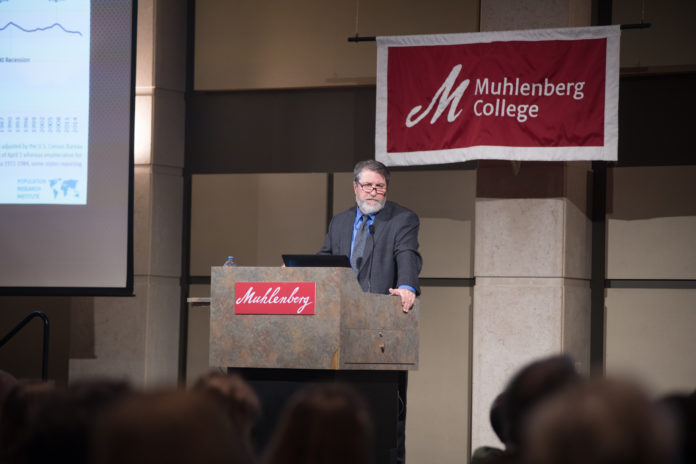
The lecture series “Elections 2018: The Politics of Urgency and Uncertainty” wrapped up on Thursday, Feb. 7 with Patrick Deneen. An author and professor at the University of Notre Dame, Deneen came to campus with a talk entitled “Why Liberalism Failed – But is Conservatism the Answer?” Drawing the attention of students, faculty and community members alike.
Deneen’s hour lecture centered around political theory and more specifically gave an in depth look at Liberalism.
“I think that the title tonight was a little bit misleading… but as Professor Gambino just indicated I’m not talking about liberalism in everyday language,” he clarified at the beginning. Quickly differentiating between the political theory of Classical Liberalism associated with John Locke and Thomas Jefferson and the left leaning modern ideology of liberalism associated with the Democratic party.
Deneen’s lecture was an attempt to show the evolution of Liberalism. He interwove the works and theories of various political philosophers to best set up his argument; that he believes Liberalism, and the governments and societies shaped around it, have reached their logical conclusion and are now on the decline.
“It’s liberalism’s great success that is leading to its failure,” Deneen said.
Using Alexis de Tocqueville’s analogy that in an aristocracy each person is a link in a larger chain, Deneen explained that John Locke and his idea of Liberalism “breaks the chain”, explaining that “our manifestation of liberty is when we become unlinked.”
It’s liberalism’s great success that is leading to its failure
Paraphrasing Locke Deneen said “we enter society only on the terms that we need as much freedom to maintain life, liberty and property.”
Deneen argues that with more freedoms people become more detached from each other. That this detachment can currently be seen in rising rates of loneliness and the ever present increase in social media. That “common culture is fading.”
In a world that is increasingly conscious of party polarization, Deneen said that “our deepest crisis isn’t necessarily polarization… it’s in the operating system.”
It was that polarization that actually led to Deneen coming to Muhlenberg. “We wanted to bring someone who had a bit of a different ideological perspective rather than the liberal vs conservative perspective…Deneen rises to that level,” Jack Gambino later explained.
“[Deneen] gives a big picture kind of view outside the normal boxes, the normal labels of our political perspective,” Gambino said, in addition to the reception of Deneen’s most recent book which “immediately touched a nerve” when it was published.
“You bring speakers to campus who are provocative to get students to think outside the box,” said Gambino. “Judging by my students in class this morning, he was successful in doing that.”
Gambino said he hopes that those who attended now “have a greater appreciation for the value of political ideas. Liberalism itself is about ideas, about how we reshape our world because we begin to think about ourselves in a different way…ideas can have a powerful impact in how people look at themselves and the world.”
Melissa writes and reports for News and the OpEd column Graphic Opinions. A senior majoring in political science; when not in class you can find her working in the College's Special Collections and Archives or on her independent study on music education advocacy.





















